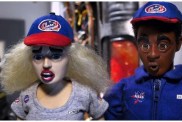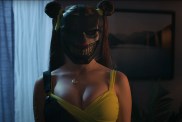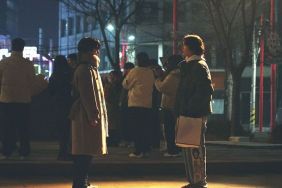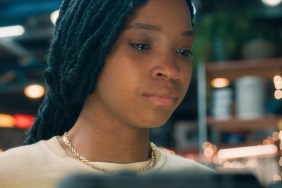The genre vet on the remake and his career

There aren’t a lot of actors as consistently interesting as Elias Koteas. Regardless of the fact that his films meet with mixed success both commercially and critically, he almost always manages to deliver a performance in them that’s memorable in some way, offering something that stands out even among ensembles that are marked by A-list talent. In his latest film, Matt Reeves’ Let Me In, Koteas plays an unnamed policeman who slowly discovers that he may be investigating a string of murders by no less than a vampire, and he gives the role a melancholy gravitas that seeps into the rest of the story.
Shock Till You Drop recently sat down with Koteas in Austin, TX, where he was doing interviews concurrent with a screening of Let Me In at Fantastic Fest.
In addition to talking about developing his role as the policeman, Koteas talked about the balance of influences from which he draws his memorable performances, and reflected on the opportunities and challenges he faces by following his creative muse rather than some sort of commercial strategy.
ShockTillYouDrop: When you work on a film like this where you have so many sources to draw upon, where do you primarily take your cues from â the script? The book? The original movie? Or just the director?
Elias Koteas: Each thing has its own challenge, you know. First of all, I fell in love with the script, and I knew I wanted to be in it. I was grateful that Matt wanted me to be a part of it. So here you’ve got this policeman who’s got no name, so in some respects superficially narratively, if you take this character out of the movie, in some ways the movie still moves forward. That’s not an indictment of it, that’s just the nature of how it’s constructed. But the more I thought about it, the more he felt like a ghost to me, and it seems that he somehow is bearing witness to events. And then I started thinking in terms of maybe, perhaps he’s at a point in his life that he has to retrace steps to find out how he got to where he got to, you know, to be at peace with himself. So there you are observing, bearing witness, and so that to me made it personal, so it allowed me to somehow in a very solitary sort of a way walk these steps, observe what’s going on and try and figure it out â and at the same time serve the investigative arm of the narrative. And at the same time try to make it personal, and humanize it.

Shock: How much of that did you feel like existed in the script in some form, and how much did you come up with on your own?
Koteas: Like I said, if you read the script, you would love the script, but the character, you didn’t know who he was, where he came from or where he’s living, other than that he’s a small-town deputy detective. It could have been anything you wanted it to be, so a lot of that is just the actor’s imagination, so anyone who would have played it would have made it their own. There was no definitive way to play “the Policeman.” But to me, what resonated to me was that investigative sort of retracing of steps and bearing witness in a very passionate way. That to me was just my imagination, along with Matt’s encouragement to keep exploring. At the end of the day, you would just take a deep breath and jump and hope for the best.
Shock: When you came onto the project, was there any impulse either to read the book or see the original movie? Or did you specifically want to stay away from any comparisons to them so you could engage in the sort of pure creation of the character?
Koteas: Yeah, I think that, what you just said. I went out and bought the book, but I have a bit of a focus problem, so I found that it read well, and it was beautiful in the few chapters [I read]. But I found myself more drawn to the script on its own, and the plight of the policeman and trying to humanize him. So all of my focus was taken there; I thought about seeing the [original] movie and I eventually will, but I just thought that I was in fertile ground where I was, so I didn’t feel the desire or the impulse or the necessity at that time.
Shock: There’s a really interesting relationship that the adults have with the children at the center of the film â they are basically defined through the point of view and perception of the kids. Do you have to filter your performance to sort of suit a conceit like that?
Koteas: It would be doing myself and the character a disservice if I only thought that, well, they’re not going to see my face, so I don’t have to do that much. The story’s not about me, but it will deprive me of a personal experience, whether or not it’s shown; most of the great stuff that actors do winds up on the cutting room floor anyway. I donât know any other way than to think that the movie is about the policeman; you’re in your own little movie. And that’s the best way you can contribute all you have, so to answer your question, I knew that in some way the story was from the boy’s perspective, but that didn’t diminish my desire to flesh out as much as I was capable at that time, and let the director kind of dictate the dynamics of that in the editing room.

It’s a dance. I’m not telling you anything you don’t already know, but you begin through discussions and reading the script and doing whatever personalization you need to do and you kind of feel like you come to kind of a happy medium. I know that itâs a very solitary experience, and during that time of my life there was a lot of things in the universe, not to sound too hokey, but the universe brings things to you that you need to work on. I feel blessed that I have this work sometimes to work through things, you know. It was the right tone instinctively at the right time. Of course there’s a little bit of jumping off and hoping you’re landing in the right sort of area, so you rely on Matt and you trust him. I’ve worked with him before, so I trust his judgment. And with the energy on the set, it somehow takes on a life of its own; so you’re never going to be just on your own, just bouncing off the walls, if you’re really sensitive to the material. So on one level you’re on your own, doing your own thing, but that’s because he trusts you to come with it and bring it.
Shock: Looking at your recent filmography, you’ve done a number of movies where there are supernatural occurrences, but in worlds where that stuff is not commonplace or accepted. Is that theme something that attracts you in particular?
Koteas: It works out that way. I mean, it’s interesting; I think about it, or I try to when a person asks me a question like that. I’m like, yeah, huh? But there is something about [the fact] that it’s possible; I mean, to me, this movie you could also look at it as a metaphor for recurring dysfunctional relationships that you keep kind of drawing the same person in to feed your dysfunction, unless you get some help or put that to rest. But Skinwalkers, I mean, I never saw it, and it wasn’t received very well, but Stan Winston, God rest his soul, was the guy who invented the stuff. So it’s whatever’s in front of me when I need to work; there’s no plan, but it just somehow works out that way.
Shock: Is there at all some kind of strategy or circumstance that would lead you to making more horror movies? Like, do you think the industry is making more of them, so you get offered them more?
Koteas: I don’t know. I like to think that, I guess, there is no plan. Like I really try to delve into why each thing comes into my life at a certain point, and if I really think about it, there’s something deep down psychologically that I’ve got to work through. You make it personal, no matter what it is, even if you never thought about it. But I don’t know what’s in store, and I feel like I’m just getting started as I’m screaming towards 50; my heart is just opening up to different things. But I don’t have any idea, man â all I know is that I can do it.

Shock: Notwithstanding the need or the thought that doing a role allows you to work through some personal issue, do you ever think about taking roles that are less of a challenge but in bigger movies that would give you greater visibility or creative opportunities in the future?
Koteas: Of course. There’s always a reason why you’re doing stuff, and it has pros and cons. Sometimes you do something because you fall in love with it and you have to do it even though it doesn’t pay you anything, and other times it’s like this thing that’s going to be high visibility, it pays you a lot of money, and it gives you certain freedoms. But it doesn’t mean that you don’t give that less of your heart than anything else; you go into it full bore. But each thing is different â whatever is in front of me, or if people want to work with me, I consider it. I wish I had a plan, but it’s really just instinctual. So there’s always something in the script that just jumps out at me â but I want to work!
Shock: You’ve had some great opportunities to play such a wide variety of roles in films of all sizes, and seem to follow your intuition more than any sort of career strategy. Do you feel like you receive all of the sorts of opportunities that you are looking for, or do you have to transform the ones that you have into something that gratifies or challenges you?
Koteas: The latter. I do the best I can with what I’m given, and do I long to keep growing and to have more responsibility? Of course. I want to work with the best directors and the visionaries, because they help me to open up and get better. But I know one thing: no matter what it is, I will pull myself into it as much as I possibly can. Sometimes it resonates with people and sometimes it doesn’t, and I can only do what I know how to do. But I hope as a mature [actor], I’m just scratching the surface, and that I might meet some directors out there with vision. Maybe they’re younger now, the younger crop of guys who are like, “Hey! You’re that guy â let’s give you a shot.” While my peers may be bored with me â I have no idea. But I do believe I’m just continuing doing what I can, and hopefully it’s longevity. I occasionally get a good shot at something, and sometimes you just come in and open the door for somebody and just throw on a flashlight for them, and other times you’re the guy who’s entering the door. But it’s an interesting journey, to say the least.




Source: Todd Gilchrist









